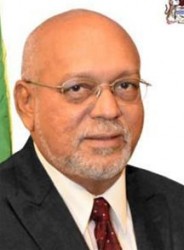President Donald Ramotar announced yesterday that he had instructed the board and management of the Guyana Power and Light Inc (GPL) to stand down the proposed 26.7% tariff increase until the government can look at ways of restoring the $5.2b subsidy for the company cut from the budget.
He made the announcement at the launch of GuyExpo 2013 at the Guyana International Conference Centre last evening.
“Today, I have had discussion with members of the board and of the management of GPL and I have instructed them to hold their hand…that they should not act and implement this decision now, while we look for a way to restore the government’s subsidy to GPL,” he said.

“Of course, we will have to do it together and we are ready to take it back to Parliament tomorrow once we are assured that we will have the support to get it passed, so that we can minimise any increase of rates that GPL will be forced to implement,” he said.
GPL has tendered its Final Return Certificate to the Public Utilities Commission (PUC) which is a step prior to the formal application for a tariff increase. The PUC would then have to consider the merits of the application and presumably invite the views of stakeholders considering the magnitude of the proposed hike.
The proposed tariff hike has prompted dissent from the private sector and unions and calls for the government and opposition to work together to avoid the hike. The president’s announcement yesterday also followed on the heels of a meeting he had with representatives of GPL, the Private Sector Commission (PSC) and the Federation of Independent Trade Unions of Guyana (FITUG).
Following the meeting on Thursday, GPL CEO Bharat Dindyal told Stabroek News that the proposed tariff hike may be implemented as early as mid-July if an alternative solution to address the company’s financial conundrum was not identified in order to allow it to complete capital projects.
“These projects are in too much an advanced staged to be halted now,” said Dindyal, who maintained that the projects must move forward. He said that the projects currently being undertaken are a result of several decades of vision and cannot be sacrificed now that the company is so close to completing them.
The PSC has said it was deeply disturbed at the proposed hike in electricity rates. The body said that it believed that the increase would lead to increased hardships for Guyanese and therefore called on the government to hold talks with GPL and the opposition in an effort to restore the $5.2 billion which was slashed from funds intended for the company.
FITUG, in its opposition to the hike, has stated that it was not convinced that GPL needs to institute such a “steep” hike. The union said that such a hike will more than likely increase the cost of production of goods, and called on the combined opposition to support the restoration of the funds which were slashed for GPL’s allocated amounts.

Dindyal said, however, that Thursday’s meeting did nothing to dissuade the company from pursuing the proposed hikes. He said that while the company heard the position of FITUG and the PSC, it still needs to move ahead with its operations, which will only be possible if the increase is implemented.
Opposition parties APNU and the AFC have also expressed their disapproval of the proposed tariff hike. Although they had been invited to meet the President on ways of avoiding the increase, the AFC declined to attend, saying that the government was only now trying to involve it in talks when it should have been doing so earlier.
Critics have dismissed GPL’s proposed tariff hike as a political ploy intended to pressure the opposition over cuts applied to the 2013 budget.
Ramotar also said yesterday that he would like to see the day when the country would not have this problem “because we would be in a position to eliminate subsidies from electricity totally.”
He said that the solution to this will be hydroelectricity. “We believe that hydroelectricity would go a very far way in satisfying our growing needs for cheap energy so that we can have broader, more efficient production and we can move ahead and compete with the rest of the world,” he said.
Ramotar said that in order to build a manufacturing sector, “we need cheap and new energy [within our country].”
“We need cheap energy for domestic use, for people in their homes, our women so that they can use different things in the household to ease the drudgery of housework and we need cheap electricity in the business community to encourage expansion, to encourage job creation and to encourage development,” he said.
“That is what this government is spending a lot of money to build the capacity of GPL and make it strong. We have to get it ready to accept hydroelectricity very soon. We must strengthen the technical aspect and managerial aspect of that,” he said.
He said that in the process the government has been conscious of not wanting to pass on all of the cost on people both at the domestic level and at the business level. “We have been subsidising strongly and in a lot of ways to help GPL to concentrate on developing their capital capabilities. The cut of more than $5B has been a serious blow and can have serious effects not only on the ordinary working people [but also businesses], many of whom have been making representation to me,” he said.





